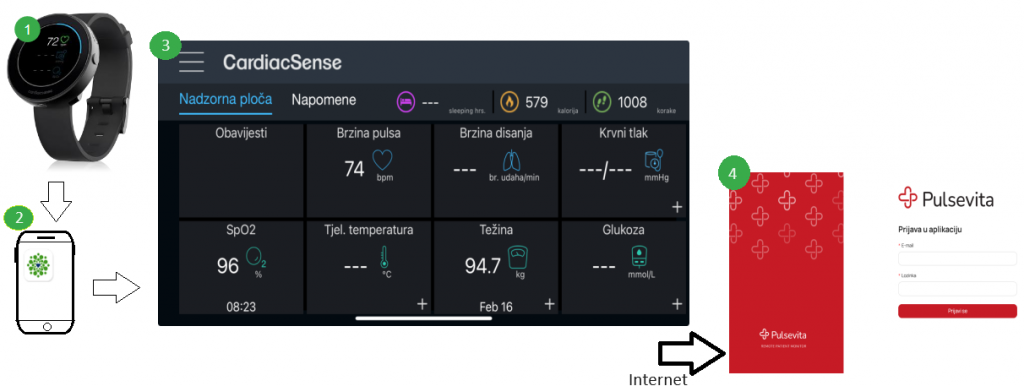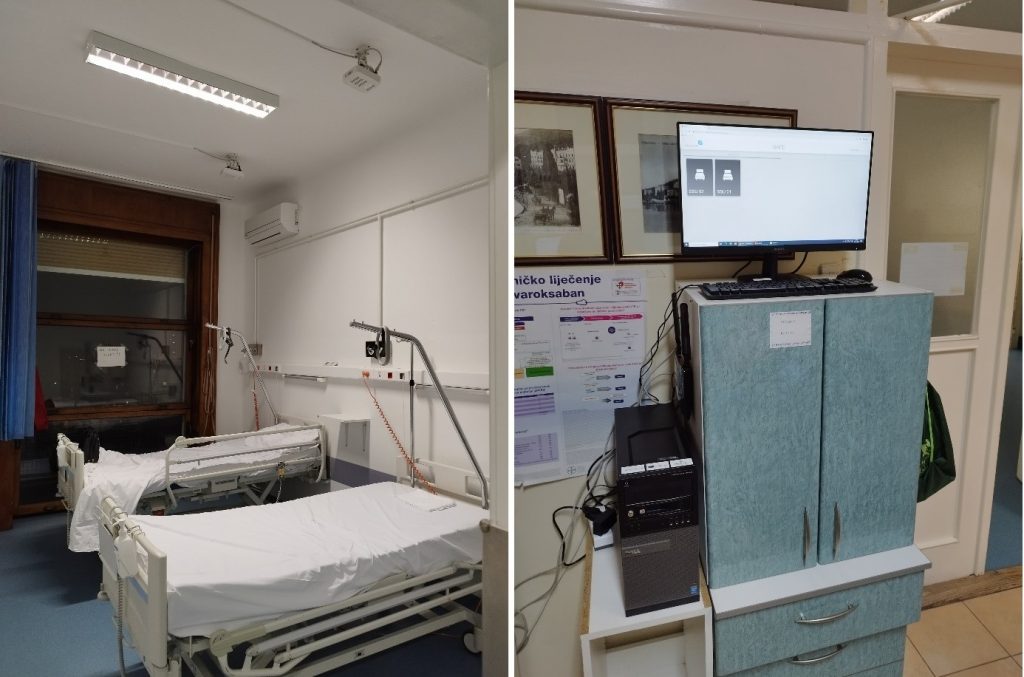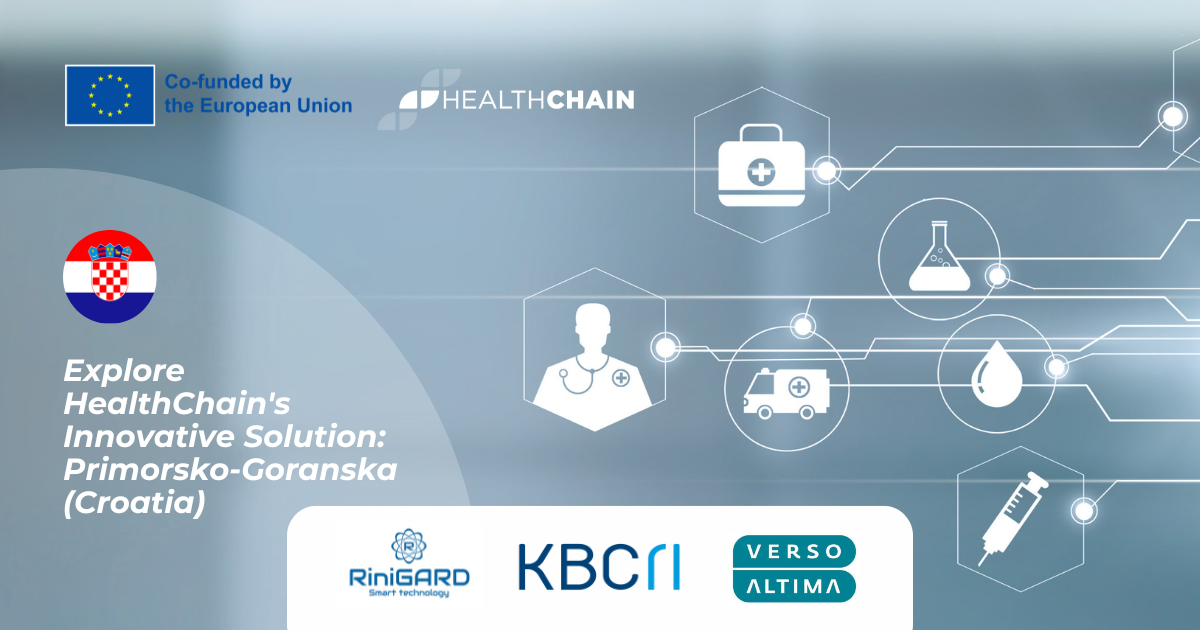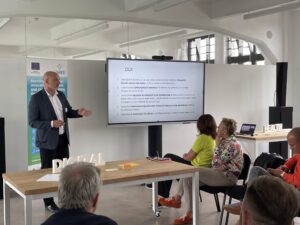Clinical Hospital Center of Rijeka (KBCRI) has identified two challenges. Each IT company in Croatian ecosystem is working on the separate solution with the KBCRI.
One of the IT companies co-creating with KBCRI is Verso Altima Group, a company with 20 years of experience and recognized internationally as a business integrator in network operations, IoT, and digital transformation, with offices in Croatia and five European countries. Together with KBCRI, Verso Altima will develop and test a solution for remote patient monitoring.
The medical device CS3 (hereinafter referred to as the “watch”) is designed for measuring and monitoring patient vital signs and detecting atrial fibrillation. The watch retains measurements and transmits them via the “CardiacSense” mobile application to a central platform where data is stored and displayed on the Pulsevita portal.
Through the Pulsevita portal, medical staff will monitor vital signs such as heart rate and electrocardiographic recordings of patients and search for rhythm disturbances or atrial fibrillation. Patients will independently record biometric measurements (i.e., body weight and blood pressure) daily and report them to the telemedicine portal via the application.

Dr. Teodora Zaninović Jurjević, MD, PhD, as the project manager of HealthChain at KBCRI, highlighted the following: the aim of the remote monitoring system for heart failure patients is to detect early signs of deterioration, enable timely interventions, reduce hospital readmissions and decrease mortality.
Expenditures associated with heart failure account for 1-2% of all healthcare expenditures, mainly due to repeated hospital readmissions. A remote monitoring system can reduce healthcare expenditures by preventing hospital readmissions and promoting more efficient use of healthcare resources. Currently, patients track their symptoms and vital signs and report this information to their doctor during personal visits. The remote monitoring system will semi-automate this process by collecting and transmitting data in real-time, reducing the burden on medical staff and patients, especially those living on islands and in the mountain area of the Primorsko-Goranska Region. However, it is important to note that remote monitoring is not a complete substitute for personal visits to the doctor; patients may still have periodic personal visits for a comprehensive examination.
After the pilot phase, a comparison will be made between patients remotely monitored and those in the control group (not monitored remotely). The control group will consist of patients with similar diagnoses as those wearing the remote monitoring device.
The second IT company collaborating with KBCRI is RiniGARD Ltd., a company based in Zagreb founded by Rinicom Ltd from Lancaster, UK, specializing in providing state-of-the-art solutions for wireless broadband communication, wireless video surveillance systems, applications for First Responders, and smart solutions for healthcare applications.
RiniGARD, in collaboration with KBCRI, will test the SAFE (System to Avoid Falls Events) solution for fall prevention from hospital beds. SAFE is an innovative system with a thermal sensor that uses smart algorithms to detect potential risky positions in the bed and enables healthcare workers to monitor patients’ care without being present in the room. If patient safety is compromised, SAFE immediately sends an alarm about the possibility of falling from the bed.
SAFE does not identify patients or staff and is developed to collect anonymous data. Although the system is designed as standalone, it can be integrated with existing or future sensor networks in the hospital to achieve a higher level of security.

RiniGARD has installed 2 devices on 2 hospital beds at the Clinic for Cardiovascular Diseases. In February 2024, with technical support from RiniGARD, KBCRI began testing the devices.
As the head of the HealthChain project on behalf of KBCRI, Dr. Teodora Zaninović Jurjević, MD, highlighted the following:
According to data, around 600,000 falls worldwide result in death annually, with falls being one of the leading causes of traumatic death. Fall rates, usually expressed per 1000 beds, typically range from 2 to 8 in acute hospitals, geriatric wards, and emergency departments.
The main goals of the challenge outlined by Dr. Teodora Zaninović Jurjević MD emphasize improving patient safety and quality of care and helping to reduce healthcare costs by reducing the incidence of falls and related injuries. Additionally, critical patients must be constantly monitored to prevent accidents due to falls or other unforeseen circumstances during careless movement.
Both RINI and KBCRI believe that the SAFE system can bring added value to the hospital and the patients. The SAFE system will allow healthcare professionals to act quickly in the event of a potential fall, enabling prompt intervention and reducing the risk of injuries. The system can also help reduce the use of physical restraints, which can be uncomfortable and distressing for patients. Patients and their caregivers benefit from knowing that they are under constant monitoring, fostering a sense of security.
During the pilot project, records about the number of falls that occur in conventional beds and beds covered by the SAFE system will be tracked. to ultimately make a comparison of results and the solution’s effectiveness.
Disclaimer: The HealthChain project is funded by the European Union. Views and opinions expressed are however those of the author(s) only and do not necessarily reflect those of the European Union or European Innovation Council and SMEs Executive Agency (EISMEA). Neither the European Union nor the granting authority can be held responsible for them.








